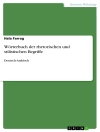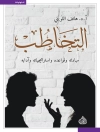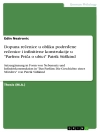This book presents an overview of sociolinguistic research in England. Showcasing developments in sociolinguistic theory, method and application, the chapters examine sociolinguistic topics on different linguistic levels and in different geographical areas across the country. Allowing the reader to engage with contemporary research in the field, each chapter is unique in the topic or geographical area explored. Topics include historical sociolinguistics, British Sign Language, lexical variation, life-span change, and variation and innovation in urban and peripheral areas; while the regions covered range from Cornwall to West Cumbria. Edited and authored by a range of international scholars, this is sure to be a key research resource for students and scholars interested in language use in England.
İçerik tablosu
Chapter 1. Introduction; Sandra Jansen and Natalie Braber. Chapter 2. Urban literacies and processes of supralocalisation: a historical sociolinguistic perspective; Anita Auer.- Chapter 3. Social change, linguistic change and sociolinguistic change in Received Pronunciation; Anne Fabricius.- Chapter 4. The changing language of urban youth: a pilot study; Rob Drummond. Chapter 5. Stylisation and the dynamics of migration, ethnicity and class; Ben Rampton.- Chapter 6. The perceptual dialectology of England; Chris Montgomery.- Chapter 7. Variation and change in British Sign Language in England; Adam Schembri, Rose Stamp, Jordan Fenlon and Kearsy Cormier.- Chapter 8. Language change and innovation in London: Multicultural London English; Sue Fox and Eivind Torgersen.- Chapter 9. The effect of economic trajectory and speaker profile on life-span change: Evidence fromstative possessives on Tyneside; Isabelle Buchstaller and Adam Mearns.- Chapter 10. Pit talk in the East Midlands; Natalie Braber.- Chapter 11. Studying intonation in varieties of English: Gender and individual variation in Liverpool; Claire Nance, Sam Kirkham, Eve Groarke.- Chapter 12. Peripheral communities and innovation. Changes in the GOOSE vowel in a West Cumbrian town; Sandra Jansen.- Chapter 13. ‘Doing Cornishness’ in the English periphery: Embodying ideology through Anglo-Cornish dialect lexis; Rhys J. Sandow and Justyna A. Robinson.- Chapter 14. Residual rhoticity and emergent r-sandhi in the north-west and south-west of England: Different approaches to hiatus-resolution?; William Barras.
Yazar hakkında
Natalie Braber is Reader in Linguistics at Nottingham Trent University, UK. Her research interests include language variation and identity in the East Midlands, perceptions of language in the region and studies around ‘pit talk’, language used by coal miners. She has published widely on language variation in the East Midlands.
Sandra Jansen is Senior Lecturer in English Linguistics at the University of Paderborn, Germany. Her research focuses on language variation and change, with a specific interest in Cumbrian dialects and L2 varieties of English. She has published several journal articles and book chapters on language changes in the far north-west of England.












